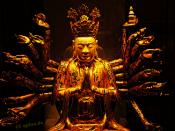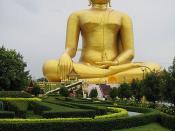Religion and politics are the same in Islam, and it becomes intertwined with one another. It teaches its people how to run a state, elect members of the government, make treaties and conduct business and commerce. It must guarantee the basic necessities of life and is responsible for its entire population. It is God that gives the government authority, not people. However, Buddhism does not create a system of government, but its concepts are present in many governments. IslamÃÂs system of law is called the Sharia, but does not have a strict set of laws. It deals with aspects of daily life, including family, sexuality, hygiene, and social issues. Yet, the Sharia is more of a system of how Muslims should serve humanity, and is based on the QurÃÂan and the Hadith. In contrast, the caste system represents a system of law in Buddhism. A person born in the caste system, puts them into categories depending on their social status, where they are unable to move to another category until their next life, and develops social acceptances and social restrictions between the categories.
In Islam, the Five Pillars represent a model for oneÃÂs life. Once one becomes a Muslim they should apply all these in your daily life. They must accept there is no god except Allah, and Muhammad is the messenger of Allah. Everyday they must worship Allah at least five times a day. They must participate in fasting during the holy month of Ramadan. This means they can not have food or drink from sunrise to sunset, and eating is allowed after sunset of each day. They must donation to the poor, but not less than 2.5% of income. Lastly, they must make a pilgrimage to Mecca once in a lifetime. Yet, it is acceptable to have someone...


